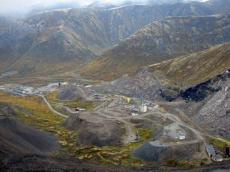|
|
TODAY.AZ / Business
Exploring deposits in key economic regions: Azerbaijan leverages natural resources for prosperity
27 May 2024 [08:30] - TODAY.AZ

Back in the Soviet era, Azerbaijan, with her fame as an oil and gas country in the South Caucasus region, has for a long time been deprived of some of its natural resources. The reason for this was that more than twenty percent of the territories of Azerbaijan remained under the occupation of Armenia. These fertile lands, rich in oil and gas on the one hand, and natural underground resources on the other, opened the way to greater prospects after the Patriotic War in 2020.
Thus, Azerbaijan is poised to embark on a significant geological exploration project aimed at detecting both ore and non-ore deposits across four of its key economic regions. This initiative, spearheaded by the Geological Exploration Agency under the Ministry of Ecology and Natural Resources, marks a strategic effort to enhance the country’s mineral resource base, potentially driving economic growth and development.
The exploration activities will be focused on the Eastern Zangazur, Garabagh, Gazakh-Tovuz, and Ganja-Dashkasan economic regions. These areas have been identified for their geological potential, and the project will involve advanced geophysical and geochemical surveying techniques. Hyperspectral and remote sensing methods will be employed to map anomalies, which are crucial for identifying promising mineral deposits.
An investment of 4.37 million manats has been allocated for this extensive exploration work. This substantial financial commitment underscores the importance placed on mineral exploration by the Azerbaijani government. The integration of the new data into existing geological and metallogenic maps will facilitate the creation of a comprehensive hybrid map of geological conditions. Such a map will be instrumental for future exploration and mining activities, providing a detailed understanding of the region's mineral wealth.
A detailed catalog of the research polygons will be compiled, documenting vital information such as coordinates, areas, dimensions, characteristic changes, and geological bases of these polygons. This meticulous record-keeping will not only aid in the current exploration but will also serve as a reference for future geological studies. Additionally, alternative exploration areas will be identified based on the findings, ensuring a continuous and systematic approach to mineral exploration.
The economic implications of this project are far-reaching. The discovery of new mineral deposits could lead to the development of new mining operations, attracting both domestic and international investment. This, in turn, would create job opportunities, boost local economies, and increase the country’s export revenues. Furthermore, enhanced geological data can improve the efficiency and sustainability of mining activities, minimizing environmental impact while maximizing economic returns.
Azerbaijan’s initiative to explore ore and non-ore deposits in its key economic regions represents a forward-thinking approach to leveraging natural resources for economic development. The combination of substantial financial investment, advanced technological methods, and strategic planning underscores the potential for significant economic gains. As the project progresses, it will be closely watched by industry stakeholders, investors, and policymakers, all keen to see how Azerbaijan capitalizes on its geological potential to foster economic growth and development.
URL: http://www.today.az/news/business/248857.html
 Print version
Print version
Connect with us. Get latest news and updates.
See Also
- 22 November 2024 [17:47]
Azerbaijan's tourism opportunities exhibited in Uzbekistan - 22 November 2024 [16:35]
Every tenth degree of global warming increases damage costs, warns Germany’s FM at COP29 - 22 November 2024 [15:16]
Azerbaijan, Turkiye discuss green energy supply and joint projects - 22 November 2024 [11:42]
Congress held with participation of negotiating teams within COP29 - 22 November 2024 [11:01]
Problems relating to plastic waste management considered at COP29 - 22 November 2024 [10:43]
UK Minister warns of ocean at risk of global warming - 22 November 2024 [10:21]
Malmö FC joins Football Alliance for climate at COP29 - 22 November 2024 [10:00]
State Border Service completes COP29 preparations successfully - 21 November 2024 [15:35]
Azerbaijani minister addresses critical issues of Climate, Nature, and Indigenous Rights - 21 November 2024 [15:16]
Scottish Parliament supports COP29 peace efforts and Azerbaijan's initiatives
Most Popular
 They were so offended that it was even funny. What does the French Foreign Ministry expect from Azerbaijan?
They were so offended that it was even funny. What does the French Foreign Ministry expect from Azerbaijan?
 Sad clowns in the arena: the old repertoire of Azerbaijan's detractors
Sad clowns in the arena: the old repertoire of Azerbaijan's detractors
 Armenians promise to get Woodrow Wilson's ideas out of the coffin
Armenians promise to get Woodrow Wilson's ideas out of the coffin
 Macron's visit to Chile ends with failure
Macron's visit to Chile ends with failure
 Communiqué of Second High-Level Meeting of Culture Ministers on Culture-Based Climate Action adopted
Communiqué of Second High-Level Meeting of Culture Ministers on Culture-Based Climate Action adopted
 Russian House in Baku to host evening in honor of Alfred Schnittke
Russian House in Baku to host evening in honor of Alfred Schnittke
 Azerbaijan leading way in decarbonized transport, says ADB Official
Azerbaijan leading way in decarbonized transport, says ADB Official
